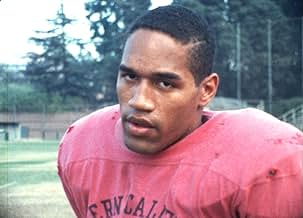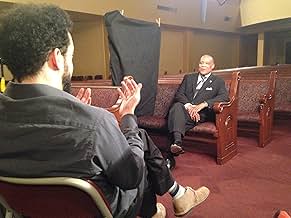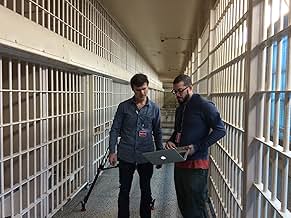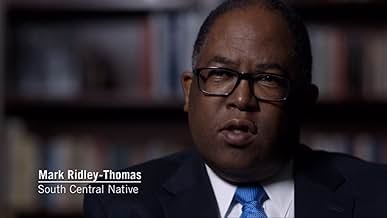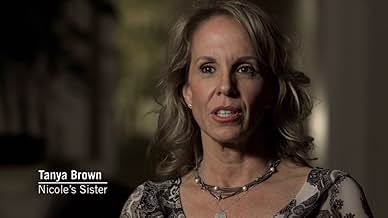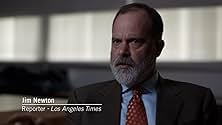NOTE IMDb
8,9/10
23 k
MA NOTE
Chronique de l'ascension et de la chute d'O.J. Simpson, dont le procès pour meurtre a révélé l'ampleur des tensions raciales aux États-Unis, révélant une nation fracturée et divisée.Chronique de l'ascension et de la chute d'O.J. Simpson, dont le procès pour meurtre a révélé l'ampleur des tensions raciales aux États-Unis, révélant une nation fracturée et divisée.Chronique de l'ascension et de la chute d'O.J. Simpson, dont le procès pour meurtre a révélé l'ampleur des tensions raciales aux États-Unis, révélant une nation fracturée et divisée.
- Récompensé par 1 Oscar
- 49 victoires et 35 nominations au total
Harry Edwards
- Self - Activist
- (as Dr. Harry Edwards)
John McKay
- Self - USC Head Coach
- (images d'archives)
Harry Alfred Khasigian
- Self - USC Teammate
- (as Fred Khasigian)
Mark Ridley Thomas
- Self - South Central Community Leader
- (as Mark Ridley-Thomas)
Avis à la une
ESPN tackles the subject of O.J. Simpson in an in-depth documentary start from his football career to his L.A. life to the trial and finally his conviction in a different case. After the compelling American Crime Story, this is a great way to provide the context. This is not simply a sports doc or a doc about the trial. This digs into the pervasive racism in the LAPD and the history of race conflicts in the area. It's also very in-depth in its examination of O.J.'s personality. This doc lays it all out very well. The trial itself is less in-depth but it's interesting in a couple of ways. There are two of the jurors as well as a harrowing explanation and pictures of the crime scene. They really bring out more reality out of the trial. This fills out everything surrounding the case. The ACS is a fun pseudo-reality drama. This doc is great at filling out the actual reality.
(RATING: ☆☆☆☆½ out of 5)
THIS FILM IS HIGHLY RECOMMENDED.
IN BRIEF: A compelling documentary that focuses on a city on fire and the "Trial of the Century".
GRADE: B+
SYNOPSIS: The O.J. Simpson trial and the many factors influencing the verdict and its aftermath.
JIM'S REVIEW: There is a fascinating 7½ hour documentary that premiered on ABC and ESPN television stations this past week and is currently streaming which is worth your attention. O.J.: Made in America may be overly long and in some need of judicious editing in parts, but it is a fascinating in-depth look back at the "Trial of the Century" and its repercussions that are relevant today.
The brutal murder of Simpson's ex-wife, Nicole Brown and her friend, Ron Goldman, on June 12, 1994 immediately made headlines and spawned a media circus, showing the incompetent handling of the case by the LAPD and District Attorney's office, and the unethical maneuverings of the prosecuting team, led by Robert Shapiro and Johnnie Cochran, to free their client and exploit the legal system.
Documentarian Ezra Edelman culled over hours of archival footage, news segments, and interviews (both then and now) to create a timely chronicle of the O.J. Simpson trial and the political unrest of a racially-divided city. He delves into the numerous 911 calls prior to the murder and Nicole's personal diary with many passages about the physical abused she suffered in her marriage to this volatile celebrity. Mr. Edelman astutely assembles new interviews with many of the people involved with the case which brings us access to observe a broken judicial system in retrospect.
The documentary shares a balanced look at the man and equally at the era. It begins with a before-and-after approach, first showing this famous incarcerated man and providing flashbacks depicting an up-and-coming young college athlete beginning his exulted career. The effect is startling. Seeing O.J. in his prime sheds new light of the man and his later fall from grace. We learn about his homophobia toward his gay estranged father, his gift for talking himself out of situations at an early age (which may have given him a false sense of security throughout his life), his lack of involvement with Civil Right issues, his innate kindness to his teammates, and the tragic death of his daughter which ended his first marriage, events that were unknown to this reviewer. We also hear of O.J's constant womanizing, his insatiable ego, his life cavorting with the rich and famous of Brentwood, his sexist and privileged attitude, and his intense jealousy and violence toward his second wife that went unheeded. Fame and wealth brought him the good life and finally corrupted the man.
But the other character in this multi-faceted tragedy is L.A. itself and the racism and injustice by the police force. Mr. Edelman's need to parallel these two tangents with the murder trial itself to make his film more complete is noteworthy, but it also gives his documentary too much latitude into this area. The film meanders into the prejudice and hate that was so rampant at the time, with the Watts riots, the Rodney King beating, and the senseless murders of African- Americans in the hands of the LAPD as the backdrop to the subsequent trial. Perhaps too much time is spent on this topic (and the famous Bronco chase) which is overstated but essential filler. Here is an accused man who erased race from his own life only to rely on it later for his freedom. That is just one irony among many. (Another is Simpson's ability to pay for his legal defense via selling autographed sports memorabilia when still being incarcerated for these murders.)
The numerous interviews and comments with former friends and colleagues are enlightening and seeing the actual cast of characters that played their parts in the trial is riveting. Particularly memorable are the words of attorney Marcia Clark, a still grieving Fred Goldman, former head D.A. Gil Garcetti, prosecuting lawyer Carl Douglas, detectives Tom Lange and Mark Fuhrman, and former friends Robin Greer, Ron Shipp, and Joe Bell. Their personal knowledge adds important details to this complicated story.
Probably the most interesting aspect about the film is the mixed emotions and personal biases felt by the jurors. (Deliberations of the verdict lasted a few hours with one member, a former Black Panther, saluting the plaintiff upon exiting the jury box.) That, and the questionable decisions handed down by the judge, Lance Ito, throughout the trial helped the prosecution play their successful "race card". Unable to see certain evidence (O.J. prior violent activities, the 911 calls, the graphic blood scene photos, the direct DNA blood connection), and falling for the grandstanding antics of that bloodied glove and a pre-staged jury's visit to Simpson's home completely changed for maximum African-American emphasis, the outcome seemed like a sure acquittal from the start. (That latter stunt by the prosecution team alone would have created a mistrial today.) O.J. may have been found not guilty, (no spoiler here), but the LAPD and their botched investigation were the ones really on trial.
O.J.: Made in America is a powerful documentary and one of the year's best films. (One would hope that it would qualify for Academy Award consideration next year, although it eluded any theatrical release as yet.) The film depicts an America filled with racial hate and anger. It shines a spotlight on domestic abuse issues. It highlights our fascination with celebrity worship and a willingness to give free rein to the lifestyle of the rich and famous while two innocent people receive no sign of justice. Mr. Edelman's epic achievement may give these victims their dues and finally a bit of justice as well.
THIS FILM IS HIGHLY RECOMMENDED.
IN BRIEF: A compelling documentary that focuses on a city on fire and the "Trial of the Century".
GRADE: B+
SYNOPSIS: The O.J. Simpson trial and the many factors influencing the verdict and its aftermath.
JIM'S REVIEW: There is a fascinating 7½ hour documentary that premiered on ABC and ESPN television stations this past week and is currently streaming which is worth your attention. O.J.: Made in America may be overly long and in some need of judicious editing in parts, but it is a fascinating in-depth look back at the "Trial of the Century" and its repercussions that are relevant today.
The brutal murder of Simpson's ex-wife, Nicole Brown and her friend, Ron Goldman, on June 12, 1994 immediately made headlines and spawned a media circus, showing the incompetent handling of the case by the LAPD and District Attorney's office, and the unethical maneuverings of the prosecuting team, led by Robert Shapiro and Johnnie Cochran, to free their client and exploit the legal system.
Documentarian Ezra Edelman culled over hours of archival footage, news segments, and interviews (both then and now) to create a timely chronicle of the O.J. Simpson trial and the political unrest of a racially-divided city. He delves into the numerous 911 calls prior to the murder and Nicole's personal diary with many passages about the physical abused she suffered in her marriage to this volatile celebrity. Mr. Edelman astutely assembles new interviews with many of the people involved with the case which brings us access to observe a broken judicial system in retrospect.
The documentary shares a balanced look at the man and equally at the era. It begins with a before-and-after approach, first showing this famous incarcerated man and providing flashbacks depicting an up-and-coming young college athlete beginning his exulted career. The effect is startling. Seeing O.J. in his prime sheds new light of the man and his later fall from grace. We learn about his homophobia toward his gay estranged father, his gift for talking himself out of situations at an early age (which may have given him a false sense of security throughout his life), his lack of involvement with Civil Right issues, his innate kindness to his teammates, and the tragic death of his daughter which ended his first marriage, events that were unknown to this reviewer. We also hear of O.J's constant womanizing, his insatiable ego, his life cavorting with the rich and famous of Brentwood, his sexist and privileged attitude, and his intense jealousy and violence toward his second wife that went unheeded. Fame and wealth brought him the good life and finally corrupted the man.
But the other character in this multi-faceted tragedy is L.A. itself and the racism and injustice by the police force. Mr. Edelman's need to parallel these two tangents with the murder trial itself to make his film more complete is noteworthy, but it also gives his documentary too much latitude into this area. The film meanders into the prejudice and hate that was so rampant at the time, with the Watts riots, the Rodney King beating, and the senseless murders of African- Americans in the hands of the LAPD as the backdrop to the subsequent trial. Perhaps too much time is spent on this topic (and the famous Bronco chase) which is overstated but essential filler. Here is an accused man who erased race from his own life only to rely on it later for his freedom. That is just one irony among many. (Another is Simpson's ability to pay for his legal defense via selling autographed sports memorabilia when still being incarcerated for these murders.)
The numerous interviews and comments with former friends and colleagues are enlightening and seeing the actual cast of characters that played their parts in the trial is riveting. Particularly memorable are the words of attorney Marcia Clark, a still grieving Fred Goldman, former head D.A. Gil Garcetti, prosecuting lawyer Carl Douglas, detectives Tom Lange and Mark Fuhrman, and former friends Robin Greer, Ron Shipp, and Joe Bell. Their personal knowledge adds important details to this complicated story.
Probably the most interesting aspect about the film is the mixed emotions and personal biases felt by the jurors. (Deliberations of the verdict lasted a few hours with one member, a former Black Panther, saluting the plaintiff upon exiting the jury box.) That, and the questionable decisions handed down by the judge, Lance Ito, throughout the trial helped the prosecution play their successful "race card". Unable to see certain evidence (O.J. prior violent activities, the 911 calls, the graphic blood scene photos, the direct DNA blood connection), and falling for the grandstanding antics of that bloodied glove and a pre-staged jury's visit to Simpson's home completely changed for maximum African-American emphasis, the outcome seemed like a sure acquittal from the start. (That latter stunt by the prosecution team alone would have created a mistrial today.) O.J. may have been found not guilty, (no spoiler here), but the LAPD and their botched investigation were the ones really on trial.
O.J.: Made in America is a powerful documentary and one of the year's best films. (One would hope that it would qualify for Academy Award consideration next year, although it eluded any theatrical release as yet.) The film depicts an America filled with racial hate and anger. It shines a spotlight on domestic abuse issues. It highlights our fascination with celebrity worship and a willingness to give free rein to the lifestyle of the rich and famous while two innocent people receive no sign of justice. Mr. Edelman's epic achievement may give these victims their dues and finally a bit of justice as well.
At the time, I didn't understand the fascination with the O.J. Simpson trial. I remember the weird slow-speed police chase of the bronco, which was so peculiar that I couldn't stop watching, but after that I never watched the trial, or read news of the trial, because I barely new who Simpson was and I thought of it as just some salacious celebrity murder case. I had no doubt Simpson was guilty - I mean, he'd gone on the run and been chased down by the cops! - but I didn't have any interest in the process of his being convicted, didn't care about Kato Kaelin or Judge Ito, or any of that.
Then he got off, and it turned out that the case was a huge one about the shocking difference in how white and black America saw U.S. justice.
This documentary puts that trial in context. First, it explains why Simpson was so beloved, portraying his phenomenal sports success and his subsequent celebrity career. It also puts the trial in the context both of the Rodney King beating and of a case I'd never heard of where an Asian woman got no jail time for shooting a black girl in the back of the head.
For white people like me, this was a simple case of a celebrity who savagely murdered his ex. But viewed through the lens of a justice system that seemed built entirely for white people, the trial was something else entirely, and Simpson's pricey lawyers took advantage of that.
The full story of Simpson, from his glory days to his final fall, is like a Shakespeare tragedy, with a shining hero undone by his own darkness. It can also be seen as the story of a cold-stone psychopath who was given a pass for continually beating his wife simply because he was a celebrity with a winning smile.
An excellent documentary, and also a perfect companion piece for the recent TV miniseries, The People vs. O.J. Simpson: An American Crime Story. Between the two, I have now learned a great deal about a case I had no interest in while it was happening.
Then he got off, and it turned out that the case was a huge one about the shocking difference in how white and black America saw U.S. justice.
This documentary puts that trial in context. First, it explains why Simpson was so beloved, portraying his phenomenal sports success and his subsequent celebrity career. It also puts the trial in the context both of the Rodney King beating and of a case I'd never heard of where an Asian woman got no jail time for shooting a black girl in the back of the head.
For white people like me, this was a simple case of a celebrity who savagely murdered his ex. But viewed through the lens of a justice system that seemed built entirely for white people, the trial was something else entirely, and Simpson's pricey lawyers took advantage of that.
The full story of Simpson, from his glory days to his final fall, is like a Shakespeare tragedy, with a shining hero undone by his own darkness. It can also be seen as the story of a cold-stone psychopath who was given a pass for continually beating his wife simply because he was a celebrity with a winning smile.
An excellent documentary, and also a perfect companion piece for the recent TV miniseries, The People vs. O.J. Simpson: An American Crime Story. Between the two, I have now learned a great deal about a case I had no interest in while it was happening.
10RM851222
Greetings from Lithuania.
"O.J.: Made in America" (2016) was without a doubt one of the very best documentaries I've ever seen, maybe even actually the best one - and i saw a few to say the least.
Although i do not live in America, i knew about some of these events before seen "O.J.: Made in America" (2016). It did not surprise me that at the end of this amazing documentary i end up almost seemingly seen a chapter from America's history, because it took for this series almost 8 hours to do it. What i was surprised about is that i couldn't imagine at the beginning that it was going to be done so convincingly great and crystal clear.
"O.J.: Made in America" features 5 episodes that all runs for almost 8 hours. But let this not scare you if kinda thinking to see it - i can't remember when the last time i was so absorb when watching a documentary.
"O.J" himself is shown here at center of events. Basically it is a biopic about his life, but at the same time if features events in Los Angeles that were surrounding him before and at the time of his (in)famous case. And all of this was shown in a very crystal clear fashion - i literally couldn't put this series down until its final frame.
Overall, "O.J.: Made in America" is magnificent look at the America's history. At the center of the event is "O.J." himself and its a fascinating look at the true American tragedy as one person puts it. Definitely one of the very, very best documentaries ever made.
"O.J.: Made in America" (2016) was without a doubt one of the very best documentaries I've ever seen, maybe even actually the best one - and i saw a few to say the least.
Although i do not live in America, i knew about some of these events before seen "O.J.: Made in America" (2016). It did not surprise me that at the end of this amazing documentary i end up almost seemingly seen a chapter from America's history, because it took for this series almost 8 hours to do it. What i was surprised about is that i couldn't imagine at the beginning that it was going to be done so convincingly great and crystal clear.
"O.J.: Made in America" features 5 episodes that all runs for almost 8 hours. But let this not scare you if kinda thinking to see it - i can't remember when the last time i was so absorb when watching a documentary.
"O.J" himself is shown here at center of events. Basically it is a biopic about his life, but at the same time if features events in Los Angeles that were surrounding him before and at the time of his (in)famous case. And all of this was shown in a very crystal clear fashion - i literally couldn't put this series down until its final frame.
Overall, "O.J.: Made in America" is magnificent look at the America's history. At the center of the event is "O.J." himself and its a fascinating look at the true American tragedy as one person puts it. Definitely one of the very, very best documentaries ever made.
A detailed view of the life of the infamous O.J. Simpson starting with his NFL carrier and his rise to an American icon to his downfall caused by one night in 1994. An excellent documentary series executed to perfection.
Le saviez-vous
- AnecdotesDirector Ezra Edelman struggled on the decision to include the forensic photos of the bodies of Nicole Brown Simpson and Ron Goldman, but ultimately decided to edit them in to remind the audience that the trial was meant to be about a horrific double homicide instead of the discussion about race and corrupt law enforcement that it ultimately progressed into.
- GaffesRobert Shapiro says in an interview with Barbara Walters that O.J. Simpson was found innocent. Simpson was found "not guilty", not "innocent".
- Citations
O.J. Simpson: [referring to his refusal to participate in the boycott of 1968 Summer Olympics along with other prominent African American athletes] I'm not black, I'm O.J.
- Bandes originalesHollywood Swinging
Written by Robert 'Kool' Bell (uncredited), Ronald Bell (uncredited), George 'Funky' Brown (uncredited), Robert 'Spike' Mickens (uncredited), Claydes Smith (uncredited), Dennis D.T. Thomas (uncredited) and Ricky Westfield (uncredited)
Performed by Kool & The Gang
Meilleurs choix
Connectez-vous pour évaluer et suivre la liste de favoris afin de recevoir des recommandations personnalisées
- How long is O.J.: Made in America?Alimenté par Alexa
Détails
Contribuer à cette page
Suggérer une modification ou ajouter du contenu manquant


